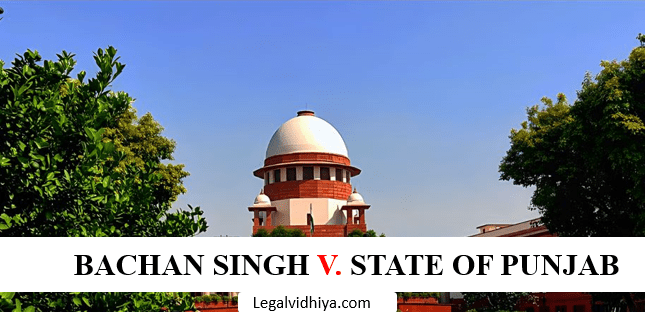
BACHAN SINGH V. STATE OF PUNJAB
(1980) 2 SCC 684
Citation | AIR 1980 SC 898 |
Date of Judgement | 9 May 1980 |
Court | Supreme Court of India |
Case type | Criminal appeal no. 273 of 1979 |
Appellant | Bachan Singh |
Respondent | State of Punjab |
Bench | Y Chandrachud, A Gupta, N Untwalia, P Bhagwati, R Sarkaria. |
Referred | 84, 235, 235(2), 299, 300, 302, 303, 354, 354(3), 360, 367. |
FACTS OF THE CASE
In the case, Bachan Singh v. State of Punjab constitutionally the decision taken in the case and death penalty have many different challenges. In this case the death penalty is very critical and this comes under the section 302 of the Indian Penal Code. Towards the death penalty, this case had taken a different road in history because when the capital punishment was continuing, suddenly the scope had been diluted. After this point, it became a landmark case under Justice P.N. Bhagwati on 9 May 1980. His death sentence was confirmed by the High Court and appeal was dismissed. Bachan Singh tried to appeal in High court but it was dismissed and death sentence has been granted for the murderers Desa Singh, Durga Bai and Veeran Bai by the judge of the session court also. But, he made an appeal to the Supreme Court of India under the constitution of Article 136 ana in his case a question was raised that in section 354(3) under the Criminal Procedure Code the fact was required in his case for ‘special purpose’.
Article 136:- special leave petition in Supreme Court of India.
Article 19(2):- restrictions of the right to freedom of speech and expression.
Article 32:- right to constitutional remedies.
Article 21:- right to life and personal liberty
Article 19:- right to equality
ISSUES
Q1. Whether under section 302 of the penal code, the death sentence that was provided for the murder offence is unconstitutional or not?
Q2. Whether under section 354(3) of the code of criminal procedure, 1973, the procedure of the sentencing was provided on the basis of the ground with unguided discretion that it invests court is unconstitutional or not?
CONTENTION OF THE PETITIONER
Counsel made an first argument for the appellant in which the death penalty was charged under the section 302 of the Indian Penal Code but, in the article 19(1) of the Indian constitution was violated. This article contains six freedoms from clause (a) to (e) and tells about the right to live that is a basic enjoyment that is mentioned in all the clauses of 19(1). the original of the Indian constitution under the article 19(1)(g), that sames to an end of all these freedoms due to death penalty.
It was against that death penalty did not contain any kind of social purpose and as it was not in the favour of the nobility of the individual person that was assured under the constitution of India, the pressure of the death penalty under article 19 will be headed to a reasonable restriction and also its value was not clear as well. The another argument was made by the appellants that under article 21 of the Indian constitution was violative as it concluded to be an unreasonable, brutal and remarkable punishment in which the dignity or we can say nobility of the individual person has also been violated.
CONTENTION OF THE RESPONDENT
Everyone has equal rights. No-one can infringe other individual rights, this was contended by the respondent. Article 19 of the Indian Constitution is concluded as an absolute right in nature and has reasonable restrictions.
JUDGEMENT OF THE CASE
In article 19(1) there are six fundamental rights of the constitution that are guaranteed are not absolute rights, this statement was given by the court. These fundamental rights of article 19 and 21 are limited to the collective responsibility of a people that they will not infringe other people’s rights.
It was held that in the constitution the article 19 and the article 21 is not violative of section 302 and also held that section 354(3) of Criminal Procedure Code was not unconstitutional and the term “special reason”: in the section means “exceptional reason”.
This is a very exceptional term. This is used mainly in the case, particularly in criminal cases. The Supreme Court declared the principle of “rarest of the rare case” only in the death penalty. Repeatedly for murder conviction, life imprisonment is like a rule and death sentence is like an exception.
RATIO DECIDENDI
A majority decision is 4:1 which was discussed by the Supreme Court of India to those of the constitutional challenges to section 302 of the Indian Penal Code and 354(3) of the Criminal Procedure Code. It was held that for murder, death sentence has been granted as an alternative punishment under section 302 is rational to the public interest.
CONCLUSION
This case concludes that this rule of death penalty has joined as a landmark judgement by the Supreme Court of India. This decision laid on both aggravating circumstances and alleviating and alleviating circumstances should be construed. As the court laid down this case as a “rarest of the rare” which is following today. But the court failed to explain the criteria for “rarest of rare” cases. Also cases such as Rajendra Prasad v. State of U.P and Jagmohan Singh v. State of U.P were discussed by the court on various precedents.
REFERENCES
This article was written by Anjali Agarwal, a student of GLA University and an intern in Legal Vidhiya.




0 Comments